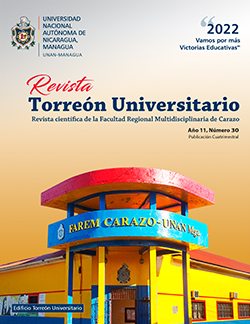Planning strategies in the audit
DOI:
https://doi.org/10.5377/rtu.v11i30.13381Keywords:
Audit procedures, audit planning, audit strategies, audit tests, work programsAbstract
The Planning of the Audit guarantees the design of a strategy adapted to the conditions of each entity based on the information gathered in the Previous Exploration stage, in this process all the Audit work is organized, the people involved, the tasks to be performed For each of the performers, the necessary resources, the objectives, programs to be applied among others, it is time to plan to guarantee success in the execution of the same.
The audit procedures are not standardized and those that are used are selected because they have particular significance with the work objectives. When the audit is planned properly, the general strategy for the examination is developed. It is essential that the auditor is thoroughly familiar with the entity. Adequate planning includes the auditor's acquisition of an understanding of the operational nature of the business, its organization, location of its facilities, sales, productions, services provided, its financial structure, purchase and sale operations and many other issues that may be significant in which you will audit. It must also know in advance the degree of confidence that can be had in the internal control, conditions that may require an extension of the audit tests, and in particular the interests of the highest Management. Often the level of knowledge acquired by the auditor is lower than that of the administration, but it must be sufficient to allow the auditor to plan and carry out the examination in accordance with generally accepted auditing standards.
Downloads
6361
HTML (Español (España)) 866
VISOR (Español (España)) 0
PDF 486
HTML 389
References
Alatrista, M. A. (13 de Junio de 2016). El proceso de la planificacion en la auditoria y su relevancia. Auditool. Obtenido de Instituto Nacional de Contadores Publicos de Colombia: https://www.incp.org.co
Balseca, J. (13 de Marzo de 2014). Calameo.com. Obtenido de Calameo. com: https://es.calameo.com
Corredor, J. (2007). La planificacion estrategica. En J. Corredor, Bases Teoricas para su aplicacion. Venezuel: Vadell Hermanos, Editores.
Garcia Gil, V. L. (1 de Junio de 2006). Estrategias y Plan de Auditoria de Informacion Financiera. Obtenido de Monografias.com: https://www.monografias.com
Hernandez Melendrez, E. E. (11 de Abril de 2016). Planeamiento de las Auditorias. Obtenido de Gestiopolis.com: https://www.gestiopolis.com
Molins Peña, M. (1998). Teoria de la Planificacion. En M. Molins Peña, Teoria de la Planificacion. Venezuela: Ediciones de Universidad Central de Venezuela,Biblioteca.
Rangel Gonzalez, J. A. (18 de Diciembre de 2006). Estrategias para mejorar auditorias de estados financieros. Estrategias para mejorar auditorias de estados financieros. Mexico, Mexico, Mexico.
Solarte Solarte, F. N. (13 de Febrero de 2012). Auditoria de sistemas. Obtenido de Auditoria de sistemas: https://auditoria de sistemas.blogspot.com
Published
How to Cite
Issue
Section
License
Copyright (c) 2022 National Autonomous University of Nicaragua, Managua (UNAN-Managua).

This work is licensed under a Creative Commons Attribution-NonCommercial-NoDerivatives 4.0 International License.
Los autores que publican en esta revista están de acuerdo con los siguientes términos.
- El autor o los autores de los artículos, ensayos o investigaciones conceden a la Universidad Nacional Autónoma de Nicaragua, Managua (UNAN-Managua) los derechos de edición (copyright) del trabajo enviado, por consiguiente la Universidad cuenta con el derecho exclusivo para publicar el artículo durante el periodo completo de los derechos de autor.
- Estos derechos de autor/ autores autorizan a la Revista Torreón Universitario y a la Universidad editar y divulgar/publicar el artículo en dicha Revista, incluyendo reproducción impresa y electrónica, el almacenamiento, recuperación y cualquier otro tipo de publicación, y fuentes de información secundaria como servicios de resúmenes y bases de datos, así mismo la facultan a proteger el artículo contra el uso no autorizado para su difusión por medios impresos o electrónicos (PDF, HTML, EPUB, XML u otros).
Licencia para el uso del contenido
La revista hace uso de la Licencia Creative Commons Atribución-NoComercial-SinDerivar 4.0 Internacional.
Bajo esta declaración:

Este revista está sujeta a una licencia de Creative Commons Reconocimiento-NoComercial-SinObraDerivada 4.0 Internacional. Puede ser copiada, distribuida y transmitida públicamente siempre y cuando se cite al autor y la fuente (Revista Torreón Universitario), no debe modificarse ni utilizarse con ningún fin comercial. La licencia completa se puede consultar en http://creativecommons.org/licenses/by-nc-nd/4.0/.



